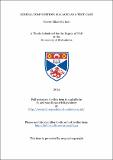Scribal composition : Malachi as a test-case
Abstract
The Hebrew Bible is the product of scribes. Whether copying, editing, conflating, adapting, or authoring, these ancient professionals were responsible for the various text designs, constructions and text-types that we have today. This thesis seeks to investigate the many practices employed by ancient scribes in literary production, or, more aptly, scribal composition. An investigation of scribal composition must incorporate inquiry into both synchronic and diachronic aspects of a text; a synchronic viewpoint can clarify diachronic features of the text and a diachronic viewpoint can clarify synchronic features of the text. To understand the text as the product of scribal composition requires recognition that the ancient scribe had a communicative goal when he engaged in the different forms of scribal composition (e.g. authoring, redacting, etc.). This communicative goal was reached through the scribal composer’s implementation of various literary techniques. By tracing the reception of a text, it is possible to demonstrate when a scribal composer successfully reached his communicative goal. Using Malachi as a test-case, three autonomous yet complementary chapters will illustrate how investigating the text as the product of scribal composition can yield new and important insights. Chapter 2: Mal 2.10-16 focuses on a particularly difficult portion of Malachi (2.10-16), noting patterns amongst the texts reused in the pericope. These patterns give information about the ancient scribe’s view of scripture and about his communicative goal. Chapter 3: Wordplay surveys Malachi for different types of the wordplay. The chapter demonstrates how a poetic feature such as wordplay, generally treated as a synchronic element, can also have diachronic implications. Chapter 4: Phinehas, he is Elijah investigates the reception of Malachi as a finished text. By tracing backwards a tradition found throughout later Jewish literature, it is evident that the literary techniques employed by the composer made his text successfully communicative.
Type
Thesis, PhD Doctor of Philosophy
Collections
Items in the St Andrews Research Repository are protected by copyright, with all rights reserved, unless otherwise indicated.

